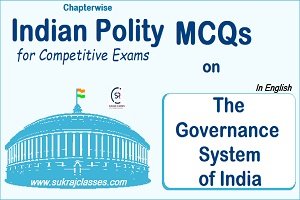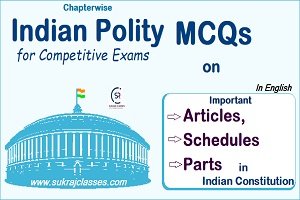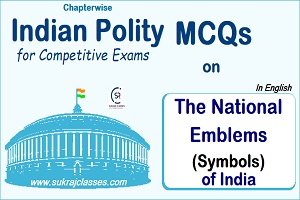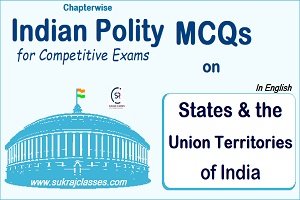
Indian Polity MCQs on “The Governance System of India”
Que- 16. The Democracy of India is based on the fact that ….?
(A) The Constitution is written
(B) Fundamental rights have been provided
(C) Public enjoys the rights to choose and change the Government
(D) Directive principles of state policy have been provided here
Que- 17. Which of the following is correct?
The main feature of a Presidential form of Government is/are …..?
(A) The Head of the Executive is the President
(B) The President appoints his Council of Ministers
(C) The President cannot dissolve the Legislature
(D) All of the above
Que- 18. Which one of the following determines that Indian Constitution is Federal?
(A) Written and non-flexible Constitution
(B) Free Judiciary
(C) Residuary powers are vested in centre/union
(D) Distribution of powers between union and states
Que- 19. Democracy’s superior virtue lies in the fact that it calls into activity of …?
(A) The intelligence and character of ordinary men and women
(B) The methods for strengthening executive leadership
(C) A superior individual with dynamism and vision
(D) A band of dedicated party workers
Que- 20. Which one of the following points differentiates the Indian Parliamentary System and British Parliamentary System?
(A) Collective Responsibility
(B) Judicial Review
(C) Bi-cameral Legislature
(D) Real and Nominal Executive
Que- 21. Indian Constitution is ….?
(A) Rigid
(B) Flexible
(C) Neither rigid nor flexible
(D) Partly rigid and partly flexible
Que- 22. Which one of the following is not a feature of Indian federalism?
(A) There is an independent judiciary in India
(B) Powers have been clearly divided between the Centre and the States
(C) The federating units have been given unequal representation in the Rajya Sabha
(D) It is the result of an agreement among the federating units
Que- 23. Which of the following is not a federal feature of the Indian Constitution?
(A) Distribution of power between Centre and States
(B) Entirely written Constitution
(C) Single Citizenship
(D) Independent Judiciary
Que- 24. Who called Indian Federalism as the Co-operative Federalism?
(A) G. Austin
(B) K.C. Wheare
(C) Sir Ivor Jennings
(D) D.D. Basu
Que- 25. The reason for the Indian Constitution being the bulkiest is that …..?
(A) It incorporates the experience of many Constitutions
(B) It contains detailed administrative provisions
(C) It deals with the Government of a large country
(D) It contains the Constitution of both Union and State Governments
Que- 26. There is parliamentary system of Government in India because the ….?
(A) Lok Sabha is elected directly by the people
(B) Parliament can amend the Constitution
(C) Rajya Sabha cannot be dissolved
(D) Council of Ministers is responsible to the Lok Sabha
Que- 27. Who rejected the ‘Principles of Administrative as myths and proverbs’?
(A) Herbert Simon
(B) Dwight Waldo
(C) Frank Marini
(D) F.W. Riggs
Que- 28. Who said, “India is a quasi-federal state”?
(A) Harold Laski
(B) Ivor Jennings
(C) Lord Bryee
(D) K.C. Wheare
Que- 29. Who of the following has stated that “The Constitution has not been set in a tight mould of Federalism”?
(A) D.D. Basu
(B) K.M. Munshi
(C) B.R. Ambedkar
(D) K.S. Aiyer
Que- 30. In relation to Indian Constitution who said that “Indian Constitution establishes good balance between Rigidity and Flexibility”?
(A) B.R. Ambedkar
(B) M.P. Payli
(C) Alexandrovics
(D) K.C. Wheare
Indian Polity MCQs on “The Governance System of India”





